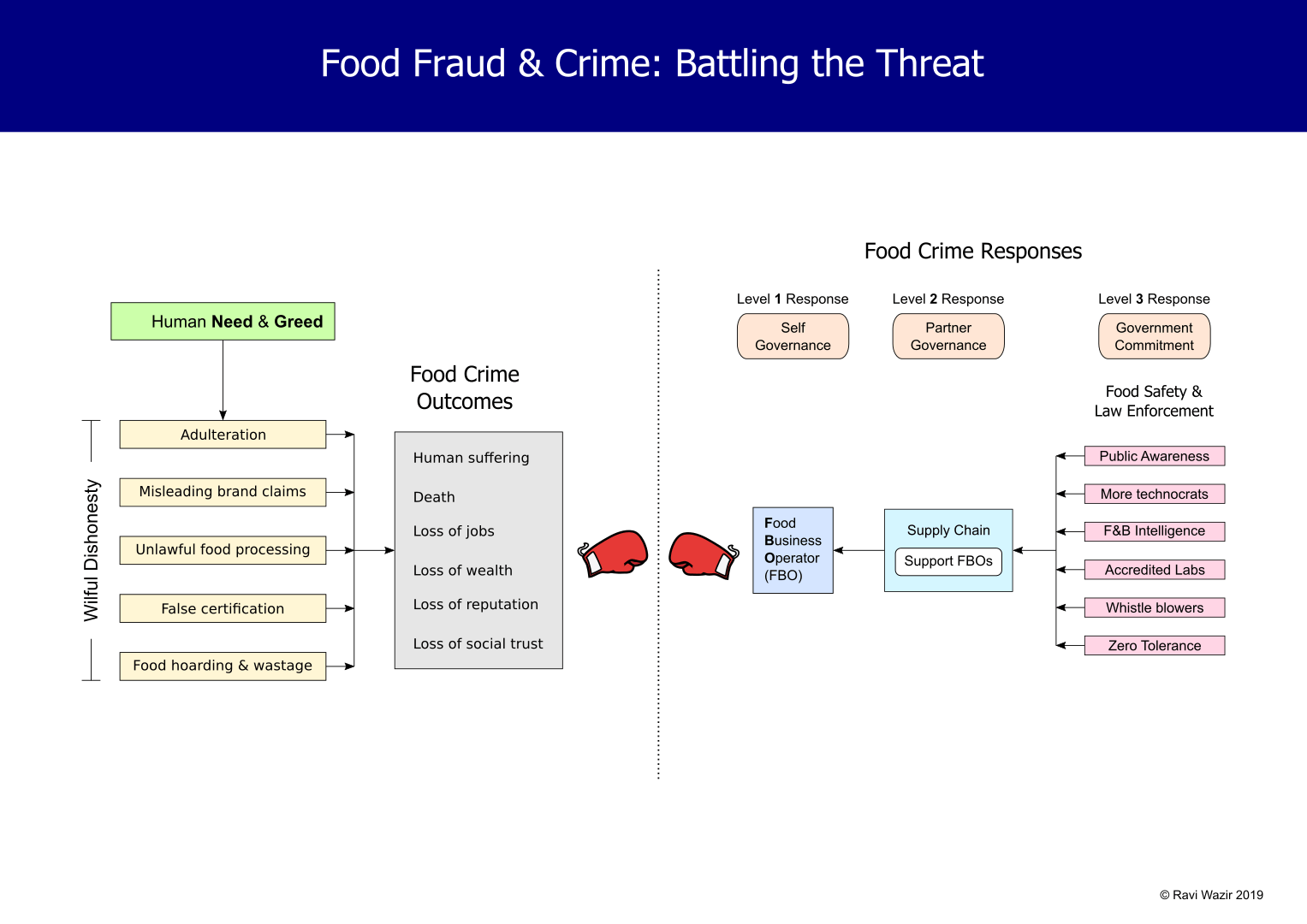Food Fraud & Crime: Battling the Threat
Let’s start with a story that a colleague shared with me...
“Imagine a group of children eating their midday meals, lucky enough to get nourishment from milk, which otherwise they would not be able to afford. Here’s how milk may sometimes be ‘made’ for them, or for the general public...
From full-fat buffalo milk, remove the milk fat which has a good market by itself. Replace it with some vegetable oil and water, emulsifying the two with detergent – which also gives it that nice frothy look. Add ammonium sulphate to increase the density, and melamine to increase the protein content. Next, add some urea to give it the body and colour it needs. (Don’t worry – I’m assured, urea is a natural constituent of milk). Now add some caustic soda, and a little sugar to adjust for taste. There’s more we can do to make it even more affordable, but it’s a family recipe and this is all I can share.
The ill-gotten gains from such fraudsters are usually enough to pay the authorities (including people in my own department) and circumvent the law. Inevitably, they get away.”
It was depressing to hear how far people go for profiteering, but I felt grateful to the food safety officer who was sharing this frustration with me.
Over the years, I learnt that besides adulteration, there are also misleading claims on labels, untrue brand narratives, unlawful food processing (unapproved premises / unauthorized techniques), fudged food certification, unchecked food hoarding & wastage, and God knows what else.
Wilful dishonesty in food production or supply that may be detrimental to consumers or overall public interest, isn’t just food fraud... it’s a crime!
Ironically, our recollection of food scams and human suffering, including death that goes with them is very short lived; as the memory dies, so does the culpability of the perpetrators.
Food crime erodes consumer trust and confidence in the system, the sector, and the nation at large. It eventually leads to loss of wealth for the business, the industry and the exchequer, and inevitably to loss of jobs and reputation as well. If we agree that this is too heavy a price to pay, we must take a united stance to fight food crime.
The key to preventing or at-least lessening food crime, as with any other crime, is to diminish the means, the motivation, or the opportunity to commit it. Basically, make it unthinkable or unattractive for Food Business Operators (FBOs) to cheat, at any stage in its supply chain. Difficult? Yes. But worth it!
Worldwide, there are two factors which over-ride the moral compass of the FBO and drive him to food crime – the need for business survival (reducing business margins from intense competition), and the greed for increasing profitability.
When legit FBOs face unfair competition from operators who use fraud to increase their margins, they’re forced to either quit or otherwise “play the game”. If they choose the latter, they inevitably transition from mere negligence in food safety to outright dishonesty.
Changing expiry dates to cut impending losses from products expiring shortly, is an example. Getting away with fraud like this emboldens operators to indulge in further unfair practices, until a point when they simply don’t know where to draw the line any more. Sad, considering the unofficial oath of an FBO to never feed his customer something he wouldn’t eat himself.
So the first level of responsibility lies with the individual FBO himself, the next level with other FBOs within his supply chain, and the final level (when the first 2 fail)... with food safety and law enforcement agencies administered by the government.

Counter fraud involves measuring the market impact of each food fraud and its financial benefit to its perpetrators. Based on this, resources of the food safety authorities and law enforcement agencies must be proportionately allocated, and punishment if any, proportionately assigned. Mined data must be used for future monitoring of FBOs.
The 110th report (2018) on the functioning of the Food Safety & Standards Authority of India (FSSAI) highlights some very candid findings of the committee (including the unholy nexus between corrupt food inspectors and unethical FBOs) and makes some fairly practical recommendations.
We need:
- Public awareness campaigns about food crime and its impact.
- More technocrats rather than bureaucrats in the system.
- Strong F&B business intelligence & investigative capabilities.
- Food testing authorization only to food laboratories accredited by NABL (National Accreditation Board for Testing and Calibration Laboratories).
- More whistle-blowers reporting food crimes.
- Zero-tolerance towards food criminality – by food safety officials & law enforcement agencies.
Now we all know how very hard it would be to implement such recommendations, and we could simply shake our heads and lament. But I believe it would be best for F&B entrepreneurs and consumers to at least do whatever is within their control and take that first step... to be the change they want to see.
As Hakan Nesser suggests, “A crime is born in the gap between the morality of society and that of the individual”.